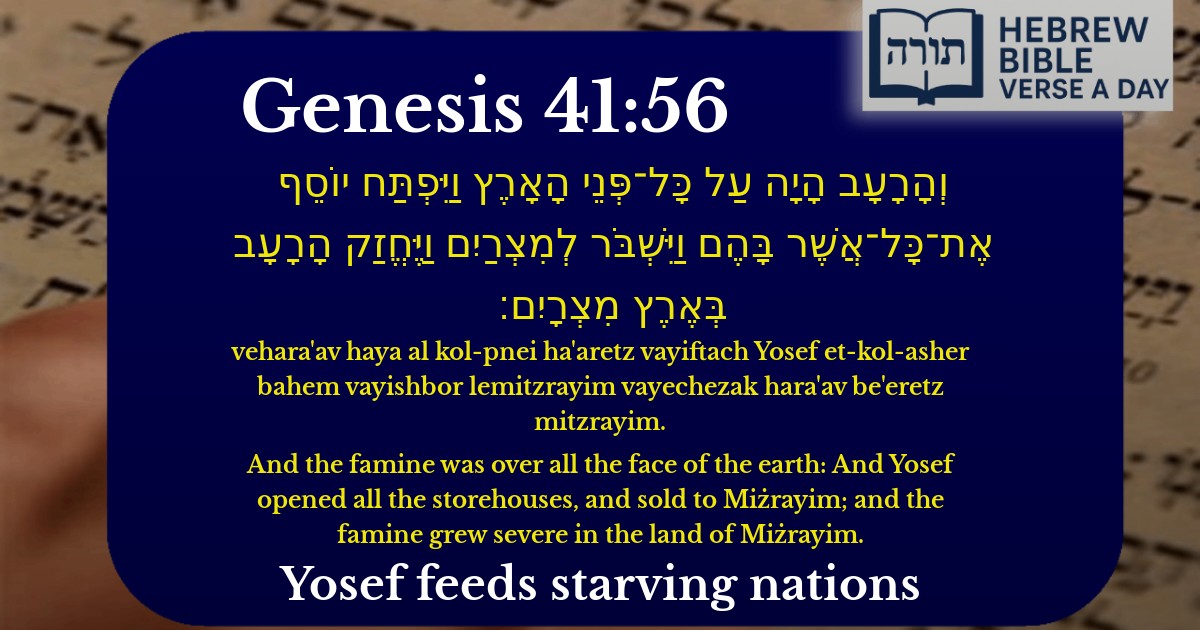Join Our Newsletter To Be Informed When New Videos Are Posted
Join the thousands of fellow Studends who rely on our videos to learn how to read the bible in Hebrew for free!
Hebrew Text
וְהָרָעָב הָיָה עַל כָּל־פְּנֵי הָאָרֶץ וַיִּפְתַּח יוֹסֵף אֶת־כָּל־אֲשֶׁר בָּהֶם וַיִּשְׁבֹּר לְמִצְרַיִם וַיֶּחֱזַק הָרָעָב בְּאֶרֶץ מִצְרָיִם׃
English Translation
And the famine was over all the face of the earth: And Yosef opened all the storehouses, and sold to Miżrayim; and the famine grew severe in the land of Miżrayim.
Transliteration
Vehara'av haya al kol-pnei ha'aretz vayiftach Yosef et-kol-asher bahem vayishbor lemitzrayim vayechezak hara'av be'eretz mitzrayim.
Hebrew Leining Text
וְהָרָעָ֣ב הָיָ֔ה עַ֖ל כׇּל־פְּנֵ֣י הָאָ֑רֶץ וַיִּפְתַּ֨ח יוֹסֵ֜ף אֶֽת־כׇּל־אֲשֶׁ֤ר בָּהֶם֙ וַיִּשְׁבֹּ֣ר לְמִצְרַ֔יִם וַיֶּחֱזַ֥ק הָֽרָעָ֖ב בְּאֶ֥רֶץ מִצְרָֽיִם׃
וְהָרָעָ֣ב הָיָ֔ה עַ֖ל כׇּל־פְּנֵ֣י הָאָ֑רֶץ וַיִּפְתַּ֨ח יוֹסֵ֜ף אֶֽת־כׇּל־אֲשֶׁ֤ר בָּהֶם֙ וַיִּשְׁבֹּ֣ר לְמִצְרַ֔יִם וַיֶּחֱזַ֥ק הָֽרָעָ֖ב בְּאֶ֥רֶץ מִצְרָֽיִם׃
🎵 Listen to leining
Parasha Commentary
📚 Talmud Citations
This verse is not quoted in the Talmud.


The Severity of the Famine
The verse states, "And the famine was over all the face of the earth", emphasizing the widespread nature of the hunger. Rashi (Bereshit 41:56) explains that this was a fulfillment of Pharaoh's dream, where the seven years of famine affected not only Egypt but all surrounding lands. The Midrash (Bereshit Rabbah 91:5) adds that this famine was Divinely ordained to bring Yosef's brothers to Egypt, setting the stage for the eventual descent and enslavement of Bnei Yisrael—a necessary step in the fulfillment of the covenant with Avraham (Bereshit 15:13).
Yosef's Role as Provider
The verse continues, "And Yosef opened all the storehouses", highlighting his leadership and foresight. Rambam (Hilchot Matnot Aniyim 10:3) derives from this episode the importance of preparing for future crises, as Yosef did by storing grain during the years of plenty. The Talmud (Yoma 76b) praises Yosef for his wisdom in managing the resources, ensuring that even during famine, there was a system in place to sustain the people.
The Economic and Spiritual Impact
The phrase "and sold to Mitzrayim" indicates that Yosef did not simply distribute the grain for free. The Kli Yakar (Bereshit 41:56) explains that this was a strategic decision to prevent hoarding and ensure fair distribution. Additionally, the Or HaChaim (Bereshit 41:56) suggests that Yosef’s actions were meant to centralize power under Pharaoh, fulfilling the dream’s prophecy that Egypt would become the dominant force in the region.
The Intensification of the Famine
The verse concludes, "and the famine grew severe in the land of Mitzrayim". The Sforno (Bereshit 41:56) notes that this severity was a test for the Egyptians, pushing them to recognize Yosef’s wisdom and Divine providence. The Netziv (Ha'amek Davar) adds that the worsening famine served to humble Egypt, preparing them to later accept Yaakov’s family when they arrived.